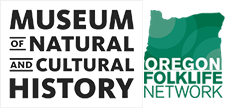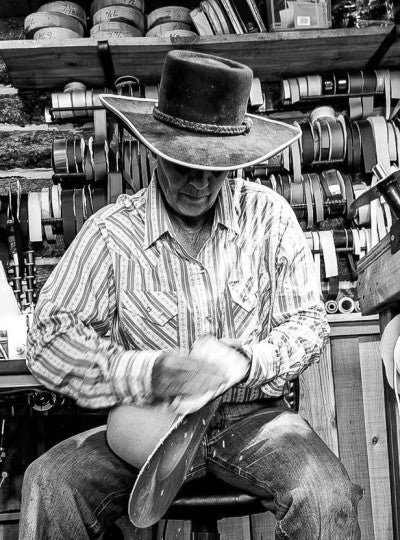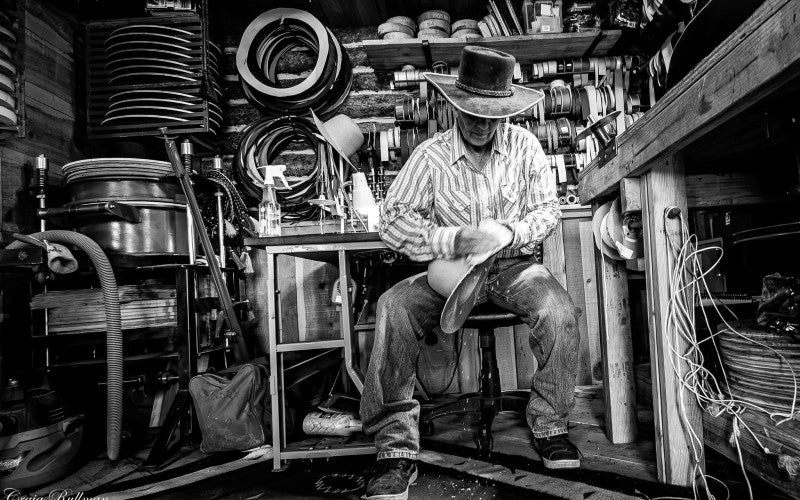Lisa Robinson (Silver Lake) is a cowboy hat maker, farrier, and trades horses. She grew up in a cowboying family in south central Oregon. After years of ranching, running cattle, and farriering, she learned to make quality, custom-made western hats of 100% beaver for working cowboys.
Bio
Lisa Robinson grew up in a cowboying family in south central Oregon. After years of ranching, running cattle, and farriering, she learned to make quality, custom-made western hats of 100% beaver for working cowboys. “I don't do any wool or rabbit or blends because they don't hold up as well. [The beaver hats] hold up better when they're wet, snow and cold. The beaver hats don't shrink, and they don't bleed dye when they get wet. They hold.” As a working cowboy (she and her husband, Paul Robinson, run their own small ranch as well as run cattle for other ranches), she knows the value and necessity of a well-made, well-fitted hat; she tailors her individuals and has her own special identifying mark—dots on the ribbon band, which, along with the look of her beaver felt hats, she can spot from a distance.
Robinson’s father, Al Prom, is a legendary cowboy in Lake County and her mother, Marcie Prom, known for her outdoor cooking, used to own the Cowboy Dinner Tree. Their children, Lisa and brother Josh, grew up learning how to ride and shoe horses from their father. At a young age, Lisa Robinson decided that horseshoeing and working was what she wanted to do most, and at age 14, she got right to it full time. When her father was injured and unable to continue horseshoeing, Lisa and her brother, Josh (also a farrier and cowboy) took over the family business; Lisa gradually took on most of the work, which meant shoeing at least 10 horses 2-3 days a week from March to October and cowboying 3-4 days a week—that kept her in the saddle from 4 a.m. until 4 p.m.
In the early 2010s, after 25 years of full-time horse shoeing and part-time cowboying, Robinson decided on a less physically demanding career—building cowboy hats. She knew from experience that good hat makers who make custom hats are hard to come by, so she set out to learn how with the goal of eventually retiring from her physically demanding work as a farrier. In early 2014 she apprenticed with two skilled master hat makers, Mike Moore who owns Buckaroo Hatters, in Tennessee, and JW Hats in Salt Lake. Several years later, she has a workshop complete with refurbished antique haberdashery equipment for her thriving business, Top Knot Hats. She and her father built the log workshop, which is filled with her custom creations. From the beaver and/or rabbit felt hat body, Lisa works to size, shape, style and press (or tighten up) the felt into a custom-made hat.
As Robinson explained, the beaver felt hat blanks come with “no structure to them. And then I use steam and I block them stretching down over block to the size I'm going to use, and then I sand and fire it and set the felt. And then it goes into a plate machine and that sets your 90-degree angle on your hat brim. And then you do some more sand and then work on the brim when you get it out. You cut it down to whatever size somebody wants and then I build the sweatband to their size and . . . and put the liners in for them. . . . It's all dependent on what a person wants in their order. You just build it from scratch.”
Robinson also refurbishes and rebuilds hats—replacing ribbons, sweatbands, and more for whatever it is people want them for: “work and dress and rodeo and play.” Each hat takes about 10-12 hours, and she usually has several going at once, because they have to rest at different stages. She customizes hats for size, style, color, and the kind of crease folks want; she’ll also add ribbons and buckles. As Robinson explained, people have different style hats, “And you can recognize who it is by the crease in their hat and the silhouette in the sky.”



